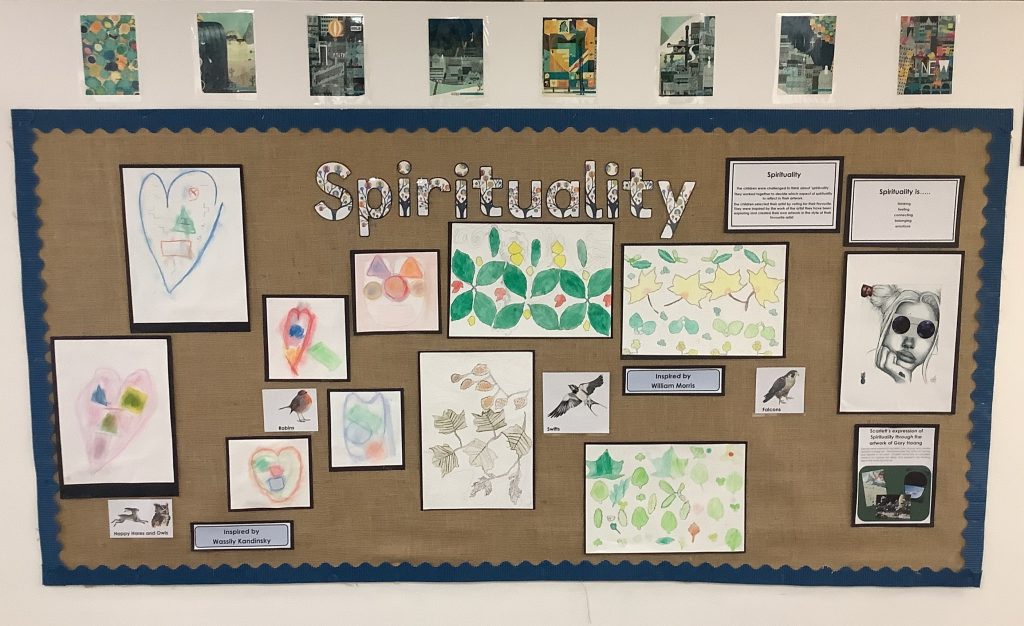
In Upper Arley C of E Primary School, development of character is central to the life of school and is driven by the school’s vision.
One community, learning and growing together, sharing God’s love
“I can do all this through Christ because he gives me strength”
‘The purpose of Church of England education is to offer a spiritual dimension to the lives of young people’ The Way Ahead (The Archbishops’ Council, 2001),
At Upper Arley C of E Primary School, all aspects of school life reflect our Christian ethos. We aim for all children to live life in all its fullness (John 10:10) and this includes their spiritual development and wisdom. That wisdom is about knowledge of and relationship to creation, including the cosmos, animals and plants. The formation of character, and of relational practices, including service, prayer, worship and contact with the natural world are at the heart of human flourishing.
At Upper Arley C of E Primary School we
- promote spirituality across the curriculum and school life.
At Upper Arley C of E Primary School we understand faith is a set of beliefs by which you live your life and may be a response to a belief in God. Faith is something you choose.
- spirituality is an aspect of human development ‐ it is not separate but integral to who we are and what makes us whole.
- Spirituality is for everybody regardless of faith.
At Upper Arley C of E Primary School spiritual development is not solely situated within Religious Education and Collective Worship but in all our connections to the curriculum, the many ways we explore learning and our relationships to each other, our environment and the wider world.
“The fruit of the Spirit is love, joy, peace, patience, kindness, goodness, faithfulness, gentleness and self-control”. (Galatians 5).
What is Spirituality?
Whilst the concept of spirituality is difficult to define, here at Upper Arley C of E Primary School, our shared definition sees the concept as central to what makes us truly human. There is an understanding that there is much awe and wonder in the world, along with a sense that we are all part of something greater. In essence, it refers to a connectedness to and appreciation of the wider world and our place within it. Spirituality is felt within ourselves by individuals and hence cannot be taught or measured – instead being something that needs to be nurtured and given the right conditions and space to grow. Therefore we acknowledge that spirituality is deeply personal and so we afford every individual with the space and opportunity to develop along their own spiritual journey. Our shared understanding of opportunities to encourage spiritual development draws upon the work of David Smith who suggested four windows into spiritual development:
Spiritual Capacities: this is the recognition that all human beings are capable of spiritual growth through capacities such as self-awareness, reflection, empathy, imagination and creativity.
Spiritual Experiences: describes the ways in which pupils can encounter the spiritual dimension of life
Spiritual Understanding: acknowledges the need to have developed an understanding to make sense of the spiritual experiences encountered and capacities exercised
Spiritual responses: demonstrates how this experience and understanding impacts on our lives and shapes the way in which we live our lives.

Here at Upper Arley C of E Primary School, we use the concept of a ring doughnut to explain Spirituality. This idea is taken from the work of Liz Mills. The Doughnut represents the ’Whole Child‘. The outer ring is the tangible (Mind and Body), the hole represents the intangible (Spirit) but if there was no hole it wouldn’t be a doughnut. it is the exploration and development of that inner self, creating calm spaces of reflection, that makes us whole.

At Upper Arley C of E Primary School, we are conscious of the ‘Windows Mirrors Doors and Traffic Lights’ analogy as ways of opening and encouraging spiritual development across the curriculum.

Windows – Encounter – Learning about life Opportunities to look out on the world to gaze and wonder: The Wow and Ows moments. The things we find amazing and bring us up short.

Mirrors – Reflection – Learning from life Giving opportunities for children to reflect, to look inward to consider some of the big questions of life: To explore their own insights and those of others.

Doors – Transformation – learning to live by putting into action what they believe Giving opportunities to children to respond, to do something to go through the door of a creative expression of their own thoughts and convictions.

Traffic lights allow us time to stop and look, to wait and think and then to move on.

